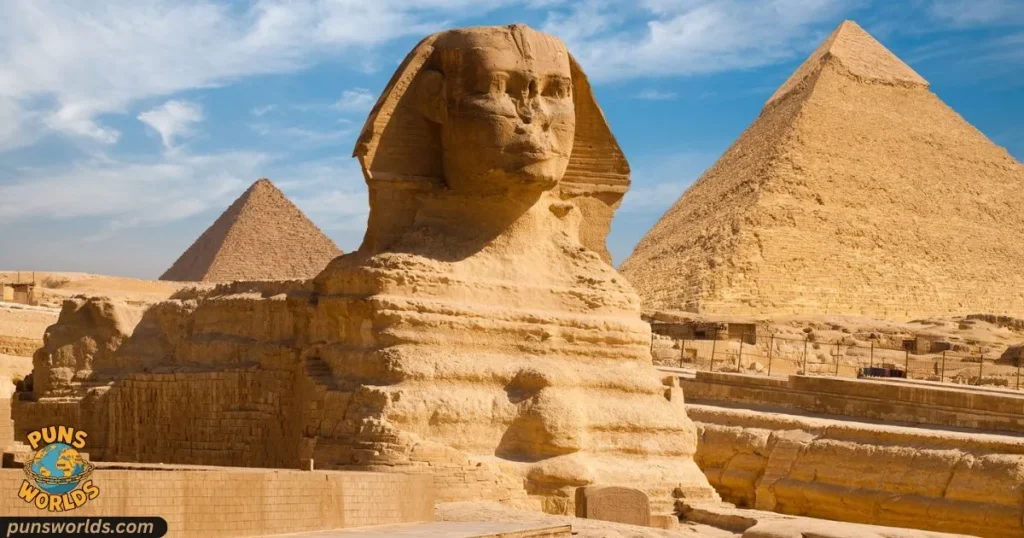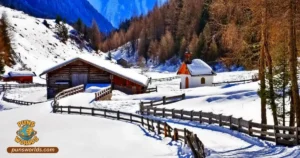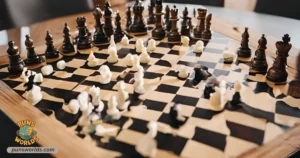History is filled with serious events, but it’s also packed with hilarious moments! Check out these puns and jokes that will make you laugh your way through ancient civilizations and beyond!
History might be full of serious events, but it’s also a goldmine for some humorous moments. From ancient times to modern events, there’s always something to laugh about when it comes to history.
Whether you’re a fan of ancient civilizations, medieval knights, or modern revolutions, these 280 history puns will have you giggling through the centuries. Let’s dive into some historical humor that’ll take you on a journey back in time!
Puns from Ancient Civilizations
- I tried telling a joke about ancient Egypt, but it fell flat—it was pyramid.
- Why did Cleopatra never fail at ruling? Because she was in de-Nile!
- The Mesopotamians were always down to earth—they invented the wheel after all.
- When the Greeks had a good joke, they said it was Homerun.
- The ancient Romans always threw the best parties—they knew how to Roman-ticize.
- What did the ancient Sumerians say when they finished their masterpiece? “That’s my cuneiform of expression!”
- Julius Caesar couldn’t stop telling jokes—he always said, “Veni, vidi, laugh-i.”
- The Greek philosophers had a lot of deep thoughts, but their jokes were always Socratic-cal.
- The ancient Egyptians loved their mummy humor, but it was all wrapped up in puns.
- Ancient builders had a hard time finishing their structures because they were always on scaffolding.
- Roman numerals—they always add up to a good numeral joke!
- The Greeks invented comedy, so it’s no wonder their puns are still running today.
- Why were the ancient Egyptians so good at jokes? They had a dry sense of humor.
- The Romans may have loved gladiator battles, but they couldn’t resist a good punny fight.
- What did the ancient mathematician say? “I’ll always be in my prime.”
- The Phoenicians were known for their shipping, but they also sent out messages in a bottle—punny ones!
- The Spartans might have been tough, but their jokes? Always spartan-taneous.
- What did the ancient artists say? “We’re painting the past in bright colors.”
- The Romans might have loved the Colosseum, but the real show was in their puns.
- Why did Alexander the Great always succeed? He knew his punchlines.
- Ancient Egyptians didn’t write on just any paper—they used papy-raw material.
- The Babylonians were great architects, but they also towered over their jokes.
- “I’ll be Zeus-ing this joke up,” said the Greek god of thunder.
- What did the Romans say when they built something quickly? “It’s done in a flash!”
- The Persians didn’t just build an empire—they built a pun empire too.
- Why were the Greeks always in a good mood? They lived by the Acropun.
- Roman historians always had the best punchlines—they loved a good historical jest.
- The ancient Sumerians were writing jokes on clay tablets long before anyone else.
- I wanted to learn about ancient Egypt, but I got wrapped up in mummy humor.
- The Greeks didn’t just believe in myth-ical stories, they believed in pun stories too.
- The Egyptians built pyramids, but they couldn’t help but peak at a good joke.
- Why did the Romans always win? Because they had the best tactics—pun tactics.
- The Greeks were all about stoic philosophy, but their jokes? Absolutely epic.
- The Romans loved wine, but they always made sure to have a punning good time.
- Ancient civilizations may have collapsed, but their jokes are still standing strong.
- The Egyptians didn’t just build pyramids, they built a foundation of great jokes.

- The Greeks gave us myths, but they also gave us legendary puns.
- What did the Romans say after a good joke? “That was punderful!”
- Why were the Egyptians so hier-istic? They had their puns written in stone.
- The Spartans may have been serious warriors, but their jokes were always sharp as a sword.
- The Romans didn’t just conquer lands—they conquered the art of punmanship.
- The Greeks didn’t just write epic poems, they wrote epic puns.
- Why did the Roman senator always tell jokes? He had a Caesarian sense of humor.
- The ancient Egyptians built pyramids, but they also built a pyramid of puns!
- The Greeks might have been philosophical, but they couldn’t resist a good pun battle.
- Romans loved spectacles, but the real show was their pun-filled banter.
- The Romans had aqueducts for water—and for puns that flow.
- Ancient civilizations might be gone, but their pun legacy lives on.
- I told a joke about ancient Rome, but no one got it—turns out, it was a bit too ancient.
- The Greeks weren’t just great at math—they were great at calculating puns too!
Medieval Puns for Knights and Castles
- Why did the knight laugh so much? He was always on a joust for humor.
- Castles are great, but have you ever tried their pun turrets?
- The blacksmith told a joke—it was a real forge of laughter!
- Medieval kings loved banquets, but they always feasted on puns.
- Why did the knight bring a pencil to the battle? To draw his sword, of course!
- Castles may be fortified, but their puns are unbreakable.
- The knights loved armor-clad jokes—they really suited their humor.
- What did the castle say when it got hurt? “I need a moat-ivator.”
- Why was the queen always laughing? She had a great sense of chivalry humor.
- The jester’s puns were so good, they were fit for a king.
- Medieval architects always had towering punchlines.
- The knights loved shielding themselves with puns.
- Why was the knight always in a good mood? He had a positive joust-titude.
- The medieval baker made the best pun-filled pies.
- The jousting match was full of lance-tastic jokes.
- What did the knight say when he won? “I’m the pun-queror!”
- Castles weren’t just built to last—they were built on stone-solid puns.
- Why did the squire laugh so hard? He was squire-ly entertained.
- The knights of the round table had the best pun-circle in the land.
- Why was the castle always full of laughter? It had a great sense of fort-itude.
- The medieval scribe wrote pun-archments that stood the test of time.
- Why did the blacksmith tell puns? To hammer home his point.
- Castles were always full of puns—they had a lot of mortar to hold them together.
- The knights were always up for a pun battle—and they never jousted lightly.
- Medieval puns are so legendary, they’ve been passed down through the ages.
- Why did the knight never quit? He always found a way to joust keep going.
- The medieval bard sang songs full of pun-etry.
- Why did the king love jokes? He had a royal sense of humor.
- The castle moat wasn’t just for defense—it was a moat-vational tool for puns.
- The jester’s jokes were so sharp, they were sword-ed in humor.
- Why was the blacksmith always smiling? He knew how to forge a good pun.
- The medieval knights had a code of chivalry, but they also had a code of pun-victory.
- Castles may crumble, but pun-laden jokes are stone-solid.
- Why was the dragon always laughing? He had a great sense of fire-timing humor.
- The knight’s armor wasn’t the only thing that was shiny—his puns were too.
- Why was the joust so funny? Because it was a real laugh-lance.
- The castle was full of pun-tastic surprises.
- Medieval kings had the best pun-chlines.
- The knight’s sword wasn’t the only thing sharp—his puns were too.
- Why did the squire always get jokes? Because he was in the pun-gon.
- The medieval jester was so good at jokes, he was considered a court jester of puns.
- Castles had a lot of moat-ivation for humor—they were always surrounded by laughs.
- Why did the king enjoy jesters? They were his favorite pun-ction in life.
- Medieval castles had pun-ctuation marks in every corner!
- The knight had a witty lance—he was always ready with a good pun.
- The medieval court always had a knightly sense of humor.
- Why did the castle get a promotion? It had a pun-derful reputation.
- The blacksmith’s puns were always hammering home.
- The king’s favorite activity? Jousting with puns.
- Why did the medieval peasants laugh so much? They had a lot of serf-titude.
English Puns & jokes
Renaissance and Enlightenment Era Puns
- Why did the Renaissance artists always paint? They wanted to make their point clear.
- What did the Enlightenment thinkers say about humor? “It’s all about reason!”
- Why was the painter always calm? He knew how to brush off stress.
- The Renaissance wasn’t just about art; it was also about art-ful puns.
- The Enlightenment philosophers didn’t just think—they pondered their puns.
- What did Leonardo da Vinci say about jokes? “They’re a mona-laugh!”
- Why did the Renaissance man always have a quill? To write pun-ny letters.
- The Enlightenment thinkers were great at debating, but they were even better at pun-ting.
- Why did the Renaissance artist always draw? He was sketching his way to laughter.
- The Enlightenment era was full of bright ideas—and even brighter puns.
- Why did the sculptor always laugh? His work was carved with humor.
- The Renaissance artists were always drawn to puns.
- Enlightenment thinkers didn’t just enlighten the world—they enlightened it with humor.
- Why was the Renaissance painter so confident? He had a brush with greatness.
- The Enlightenment era had a lot of humor—it was a real reason to laugh.
- What did the sculptor say about puns? “They’re chiseled to perfection!”
- The Renaissance was a time of artful humor and creativity.
- Why did the Enlightenment thinkers love debates? They were always up for a good pun-versation.
- The Renaissance artists had masterful jokes—they knew how to paint a picture of humor.
- Why did the philosopher never get lost? He had a great sense of direction—and humor.
- The Enlightenment thinkers were so good at jokes, they were considered philosophi-laughs.
- Why was the Renaissance always full of art? Because it was also full of pun.
- The Enlightenment thinkers knew how to reason their way into a good laugh.
- What did the artist say about his work? “It’s a masterpiece of humor!”
- The Renaissance was all about reinventing humor—one pun at a time.
- Why did the sculptor laugh? He was in-tune with his craft and his jokes.
- The Enlightenment thinkers had a lot of light-hearted humor.
- Why did the Renaissance painter always carry a brush? To make sure his humor was well-brushed.
- The Enlightenment was a time for thinking deeply—and laughing heartily.
- What did the sculptor say about his latest joke? “It’s chiseled into memory!”
- The Renaissance era was full of artful puns—every masterpiece had a humorous twist.
- Why did the Renaissance artist never get bored? He always had a palette of puns.
- The Enlightenment thinkers loved a good debate—but they loved a good pun even more.
- Why did the painter enjoy life so much? His world was always brushed with humor.
- The Renaissance was a golden age for both art and humor.
- Why did the Enlightenment thinkers keep their humor to themselves? They didn’t want to enlighten too much!
- The Renaissance artists knew how to add a little humor to their creations.
- Why did the philosopher love jokes? They were his way of reasoning.
- The Enlightenment era was as much about reason as it was about laughter.
- What did the sculptor say when he heard a joke? “That’s a chisel of a punchline!”
- The Renaissance painters were known for their brush strokes—and their pun strokes.
- Why was the Enlightenment thinker always smiling? He had a lot of rational humor.
- The Renaissance was a time of great art and even greater puns.
- Why did the philosopher write so many jokes? He wanted to reason with his audience.
- The Enlightenment era had a lot of bright ideas—and even brighter puns.
- Why was the Renaissance painter never unhappy? His life was always painted with humor.
- The Enlightenment thinkers had a lot of deep thoughts, but they also had a lot of deep laughs.
- What did the artist say about his humor? “It’s frame-worthy!”
- The Renaissance wasn’t just a time for art—it was a time for pun-ting.
- Why did the sculptor enjoy his job? He loved to carve out a good laugh!
Modern History Puns and Jokes
- Why was the modern historian always cheerful? He had a lot of perspective on life.
- What did the 20th-century historian say about puns? “They’re a modern marvel!”
- The Cold War was intense, but even then, they managed to keep the puns chill.
- Why did the 21st-century historian always carry a pen? For writing pun-ctuations in history!
- Modern historians know how to frame a good story—and a good pun.
- Why was the historian’s computer always happy? It had a lot of byte-sized puns.
- The modern historian didn’t just study history; he also crafted a lot of jokes.
- What did the modern history book say? “I’m full of pun and information!”
- Why did the 20th-century historian love technology? It made pun-ting so much easier.
- Modern history is full of twists and turns—and so are the best puns.
- What did the modern historian say about his work? “It’s a page-turner of puns!”
- Why did the historian become a comedian? He wanted to chronicle laughter.
- The modern era is all about tech, and it’s also about pun-tech.
- Why did the modern historian use a computer? To create byte-sized jokes!
- What did the historian say about the 21st century? “It’s a modern era of humor.”
- The 20th century wasn’t just about progress; it was about progressive puns.
- Why did the historian love digital archives? They made it easy to scroll through puns.
- The modern historian’s favorite tool? The pun-ting machine!
- What did the historian say about the internet? “It’s a web of jokes!”
- Why did the 21st-century historian love memes? They were the perfect historical reference.
- The modern era has a lot of innovations—and a lot of innovative puns.
- Why did the historian carry a smartphone? To keep track of all the pun-dits.
- The 20th century had a lot of revolutions—including the revolution of humor.
- What did the historian say about modern technology? “It’s revolutionary for puns!”
- The historian loved studying the past and making present-day puns.
- Why did the modern historian enjoy digital archives? They had pun-derful data!
- What did the historian say about online history? “It’s a digital diary of jokes!”
- The modern era is full of historical references—and humorous ones too.
- Why did the historian use social media? To share pun-tastic insights.
- What did the 21st-century historian say about jokes? “They’re timeless!”
- Why was the historian always on Twitter? To tweet out some puns.
- The 20th century was full of pivotal moments—and pivotal puns.
- What did the historian say about modern jokes? “They’re cutting-edge!”
- The historian’s favorite hobby? Revising old jokes with new twists.
- Why did the historian enjoy pop culture? It provided pun-derful material.
- What did the historian say about the internet’s impact? “It’s a web of humor!”
- The modern historian loved digitally archiving jokes for future laughs.
- Why did the historian use a blog? To share historical puns and modern laughs.
- The 21st century has a lot of evolution—and evolutionary puns.
- What did the historian say about memes? “They’re historically significant!”
- Why was the historian always updating his jokes? To stay current with humor.
- The modern era is full of innovations and pun-ovations.
- What did the historian say about digital jokes? “They’re byte-sized fun!”
- The 20th century had a lot of progress—and progressive puns.
- Why did the historian love digital archives? They made it easy to archive jokes!
- What did the modern historian say about jokes? “They’re a modern marvel!”
- Why was the historian always on his phone? To share pun-derful moments.
- The 21st century has a lot of technological advances—and a lot of pun advances.
- The historian’s favorite pastime? Revising old jokes with new puns.
- What did the historian say about modern humor? “It’s a historic delight!”
Global History Puns and Jokes
- Why did the global historian love traveling? He wanted to map out the best jokes.
- What did the historian say about global history? “It’s a world of puns!”
- Why was the global historian always on the move? To discover pun-damental truths.
- The global history of humor is as diverse as its cultural backgrounds.
- Why did the historian study different cultures? To find the pun-ultimate joke!
- What did the global historian say about diversity? “It’s the spice of puns!”
- Why did the historian love international jokes? They had worldly appeal.
- The global historian’s favorite pastime? Collecting puns from every corner of the world.
- Why did the historian visit different countries? To explore their puns.
- What did the historian say about cultural jokes? “They’re richly amusing!”
- The global historian enjoyed international humor because it was pun-iversal.
- Why was the historian fascinated by world cultures? They offered a worldwide view of jokes.
- What did the historian say about global puns? “They’re universal language!”
- Why did the historian love traveling? To find new and pun-derful jokes.
- The global history of humor is as varied as the landscapes it covers.
- Why did the historian enjoy cultural festivals? They were full of pun-derful moments.
- What did the historian say about cross-cultural jokes? “They’re borderless fun!”
- The global historian knew that puns were a universal delight.
- Why did the historian attend international conferences? To hear the best global puns.
- What did the global historian say about different cultures? “They’re a treasure trove of jokes!”
- Why did the historian love cultural exchanges? They were full of pun-derful surprises.
- The global historian enjoyed discovering jokes from different cultural backgrounds.
- Why did the historian study different regions? To learn their pun-ting styles.
- What did the global historian say about humor? “It’s a worldwide phenomenon!”
- The global history of jokes is as diverse as the countries they come from.
- Why did the historian love multicultural events? They were rich in puns.
- What did the historian say about international jokes? “They’re culturally significant!”
- Why was the historian always looking for new puns? To make his collection international.
- The global historian enjoyed sharing jokes from around the world.
- What did the historian say about humor across cultures? “It’s a global treasure!”
- Why did the historian love learning about different cultures? They provided pun-derful insights.
- What did the global historian say about diverse jokes? “They’re a melting pot of humor!”
- Why did the historian appreciate cultural diversity? It added a splash of humor.
- The global history of jokes is as dynamic as the cultures it represents.
- What did the historian say about international humor? “It’s cross-culturally funny!”
- Why did the historian collect puns from every culture? To create a pun-iverse.
- The global historian knew that laughter was the best international language.
- What did the historian say about world cultures? “They’re full of pun-filled stories!”
- Why did the historian enjoy studying different nations? They offered a world of humor.
- The global historian found that every culture had its own unique pun-ting style.
- What did the historian say about cultural humor? “It’s a universal delight!”
- Why did the historian study world history? To uncover the best pun-tential jokes.
- The global historian’s favorite finds? Internationally renowned puns.
- What did the historian say about diverse humor? “It’s a celebration of laughs!”
- Why did the historian love global jokes? They had a worldwide appeal.
- The global history of jokes is full of colorful and pun-derful anecdotes.
- What did the historian say about cultural humor? “It’s a global phenomenon!”
- Why did the historian attend international festivals? To experience the pun-derful world.
- The global historian knew that humor was a bridge between cultures.
- What did the historian say about the global humor scene? “It’s a world of jokes waiting to be explored!”
Fun Facts and Historical Humor
- Did you know? The first recorded joke was from ancient Sumeria—a real pun-ting breakthrough!
- The oldest known joke book is from Greece—Aristotle would be proud of these puns.
- The Roman Emperor Nero was known for his dramatic puns—he loved a good show of humor.
- The medieval jester was a master of ceremonies and pun-derful humor.
- Benjamin Franklin was not only a founding father but also a lover of pun-ny sayings.
- The first newspaper joke was published in 17th-century England—a real pun-ting milestone!
- The Renaissance was a time of great inventions—including some inventive puns.
- The ancient Egyptians had a lot of fun with their hieroglyphs, many of which were pun-filled.
- Did you know that the jester was an important figure in medieval courts? They were known for their pun-derful antics.
- The Enlightenment was a time for reasoning—and reasonably good jokes.
- The first joke book was published in the 19th century—a true pun-ting achievement!
- Did you know? Cleopatra loved a good pun-derful joke, especially about her reign.
- The Ancient Greeks had a lot of philosophical humor, but they also had a lot of pun-ctuation.
- The medieval knights didn’t just battle—they also had a lot of pun-tastic moments.
- The ancient Romans loved gladiator battles, but they also loved gladiator-ing with puns.

- The Renaissance was a time for art—and also for art-fully crafted jokes.
- Did you know that the first recorded stand-up comedian was from ancient Rome? Talk about a punchline!
- The medieval courts were full of pun-derful characters, including the jester and the court fool.
- The first joke book in English was published in the 18th century—a real pun-derful achievement.
- Did you know that the ancient Egyptians had a lot of fun with their pun-derful hieroglyphs?
- The Enlightenment era was full of rational humor and pun-derful observations.
- The first humor magazine was published in the 19th century—a true pun-ting revolution.
- Did you know that Cleopatra was known for her witty remarks? She had a lot of pun in her reign.
- The medieval period was full of pun-tastic stories, especially about knights and jesters.
- The first comedy club was in ancient Rome—a real pun-derful venue for laughter!
- Did you know that the ancient Greeks had a lot of fun with their pun-filled theater?
- The Renaissance was a time for great art—and also for great puns.
- The first joke about technology was from the 19th century—a real pun-derful development!
- Did you know that the medieval jester was a master of puns and humor?
- The Enlightenment era had a lot of witty thinkers who enjoyed pun-ning.
- The first humor magazine was a great success in the 19th century—a real pun-ting sensation!
- Did you know that ancient Romans enjoyed humorous performances in the theater?
- The Renaissance was a time of innovation—and also of innovative puns.
- The first joke about history was written in ancient Rome—a real pun-derful find!
- Did you know that Cleopatra enjoyed funny quips about her reign?
- The medieval court was full of pun-derful moments and jester antics.
- The first joke book in English was a real pun-ting milestone.
- Did you know that ancient Greeks had a lot of fun with their pun-filled plays?
- The Renaissance was a time for great discoveries—and great discoveries in humor too!
- The first stand-up comedian was from ancient Rome—a real pun-derful historical figure.
- Did you know that Cleopatra had a lot of witty puns in her court?
- The medieval period had a lot of fun with jester jokes and court humor.
- The first humor magazine was a great success in the 19th century—a real pun-ting achievement!
- Did you know that ancient Egyptians enjoyed punny hieroglyphs?
- The Renaissance was a time for great humor—and great humorists.
- The first joke about art was from the Renaissance—a real pun-derful creation!
- Did you know that the medieval jester was a master of puns and humor?
- The Enlightenment era had a lot of pun-derful thinkers and witty observations.
- The first comedy club was a real pun-ting venue in ancient Rome.
- Did you know that Cleopatra’s court was full of witty and pun-derful conversations?
FAQs
What is a historical pun?
A historical pun is a joke or play on words that relates to historical events, figures, or periods, often used to add a humorous twist to historical facts or narratives.
Why are puns used in historical contexts?
Puns are used to make historical content more engaging and memorable. They can lighten complex topics, making them more accessible and enjoyable to a broader audience.
Can puns be accurate when discussing history?
While puns are meant for humor, they can be accurate if they are based on real historical facts or contexts. However, their primary purpose is to entertain rather than provide precise historical analysis.
Who were some famous historical figures known for their sense of humor?
Figures like Benjamin Franklin, Winston Churchill, and Mark Twain are well-known for their wit and humor. They used their cleverness to comment on their times and entertain others.
How can I use historical puns in my own writing?
You can use historical puns to add humor and interest to your writing. Ensure they are relevant to the context and use them to highlight or emphasize historical points in a fun and engaging way.
Conclusion
Exploring history through humor reveals how laughter transcends time and culture. From the ancient Egyptians to modern historians, the art of the pun has been a delightful way to connect with our past. Whether it’s through clever wordplay or humorous observations, history’s greatest minds have found joy in making us smile.
By integrating puns into our understanding of historical events, we not only enrich our knowledge but also make learning about the past a more enjoyable experience. As we continue to explore the annals of history, let’s remember that humor, much like history, is a universal language that brings us together.
So, the next time you delve into a historical topic, don’t forget to add a touch of pun-derful humor to keep the past alive with laughter.

I’m Jane Austen, and I bring a touch of classic wit to Puns Worlds. My puns blend humor with a timeless elegance, offering readers a delightful escape into wordplay.











